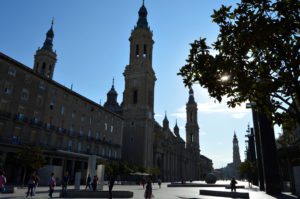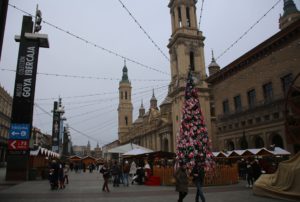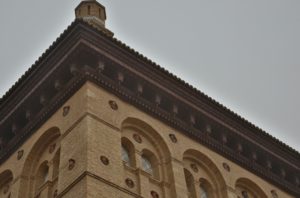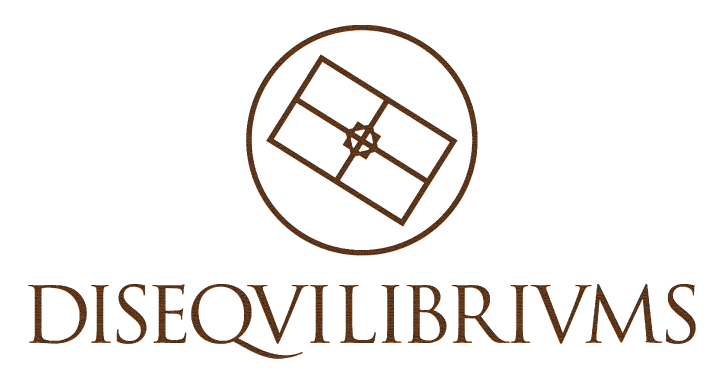DISEQUILIBRIUMS. The Individuals. Chapter 14
CHAPTER 14
Monday 19 December 2016
Time: 4:00 pm

I observe my four companions as we walk through the centre of Plaza del Pilar. It is impressive. Each time I come here, I enjoy looking up to admire the whole scene from the great fountain. I like entering the plaza from the area of the Old Courts, more than from any of the other streets.
I take in the fountain and the sculptures in this part of the plaza.
The fountain represents the map of South America and the large globe, the world as it was before Christopher Columbus left on his voyage of Discovery. That I understand. But those three walls representing the three caravels he used to cross the Atlantic, that’s too much for my imagination.
In any case, and from the photos of the past that I’ve seen, I’d say that I’ve always liked this plaza, then as now. I can’t remember exactly when it changed. I’d say that there were two occasions: the first was when they remodelled the plaza and installed these large lights; the other was after the World Fair in 2008, when they cleaned the towers of the Basilica. The best thing about this plaza is the great open space, often used to hold large crowds of people, especially during festival times in the city.
I have great memories of this place. When I was small, I used to play with my parents and my brother with the water in the little, round fountains near the entrance of the Basilica. What I enjoyed most was when my mother managed to get the pigeons – and there were hundreds of them – to eat out of her hand. She was thrilled. I had always pictured myself getting all of them to eat from my hand. My parents would be proudly watching me. Everyone in the plaza would be talking about me. But I never could, because I was incapable of keeping still for a minute without fidgeting, and of course, that would scare the birds away.

The pigeons must be hiding today because I can’t see any of them. It’s an unpleasant day to go for a walk. There is a strong freezing wind and we are practically alone in the plaza. Both birds and people must have thought that it wasn’t a good afternoon to be out like this… Only us, and only because we have a very specific aim.
“What did they tell you at home when you said that you weren’t going to have lunch?” Erik asks us.
“They didn’t give me any hassle.” Elsa replied, “but I mentioned that I was going to do a project with you all.”
“At least, you didn’t lie to them.” I interrupt her. “We are going to do a project.”
“I had a bit of a problem because, since my father’s disappearance, my mum, brother, sister and I have always eaten together,” Sofia remarks. “It was a bit awkward because my mother, in fact, didn’t say a word. She simply went quiet.” There is a pause. “That’s worse.”
Erik goes to her, puts his hand on her shoulder and draws her towards him. She rests her head against him. I can’t stand it. I turn away.
That’s the other reason why I feel so close to her. We were both left without our fathers. For me, it happened many years ago, but for her, it’s been less than a year now. I’ve only just realised that, this time, I’m not thinking about Erik’s gesture of affection in holding her, but in how Sofia must be feeling. How I would love to tell her how much I feel for her! How I would love to console her at this moment because I’ve already gone through it! But I am churning away at something which is crushing me from inside. And it is pointless. I’m going to have to put a stop to this.

We are heading for the address the guide at the museum had given to Sofia. I look at the building on my left. It’s the La Lonja building. To break the silence, Sofia remarks:
“I’ve always thought this building impressive. The details at the top with faces embedded on the facade and along the external walls are very interesting, mainly because I’ve never understood what they stand for.”
As we pass near the building, Elsa points north where we could see the stone bridge over the Ebro.
“Look! The northern gate to the city must have been there. There is nothing there now, but the other day, I saw in a book that it was called the Angel Gate, and there was a sculpture above the entrance.”
“Better not mention what really happened at the gate.” Samuel suggests.
“Why do you say that?” Elsa inquires, looking at him in surprise.
With a look of disgust on his face and in a low voice, he explains, “For years, they left the bodies of crooks and criminals executed in the city hanging for months so that everyone entering the city could see and know what they did in Zaragoza.”
The girls look like they are going to be sick. Erik and I look at each other knowingly, and shrug our shoulders.
As we continue walking, we look to our left towards the old Angel Gate.
Pointing at the stone bridge, Samuel continues, “The worst was when they executed the Lord Chancellor of Aragon in 1592, soon after Castilian troops occupied the city. They left his body hanging for seven years until 1599 when Philip III visited.”
“How barbaric!” Elsa exclaimed. “How disgusting! How could they do that?”
What a history! It would only occur to Samuel to tell a story like that? That boy only seems to know about gruesome things.
Erik has only just discovered that he does not like history after all. I notice him stopping just as we pass in front of the Cathedral of San Salvador, also called La Seo, making us turn to look at him:
“By the way, changing the subject,” he starts, “my parents did not get a text message on ‘Zaragozacollapses’, but all the parents of our classmates that I have asked received one.”
I look at Samuel, on my right, to see if he was going to take the opportunity to give us the information he hadn’t wanted to disclose earlier. But it’s clear that this boy only speaks when he wants to. We will never know if his parents received the same message or not. We will never really know anything about his parents. He just resumes walking in his own customary style in which even his shoulders also seem to be walking, one forward and then back, and then the other and so on. He doesn’t even look at us.
Sofia pipes up:
“Actually, I asked the teachers this morning, and they also received a message. It’s very odd.”
“Well, I think it’s a marketing campaign,” I add. I manage to grab Sofia’s attention. “I’m sure that they have commissioned some company to run a new ad campaign to promote the city.”
“Well, they must be doing a really good job,” she responds.
“Why do you say that?” Elsa inquires, turning to her.
“Because lots of people are talking about Zaragoza,” Sofia responds. “The message you are talking about, everyone who’s received it has sent it on to someone else because it looked so interesting. It’s gone viral.”
“It is worse than that. You are not going to believe it,” Erik suddenly interrupts, looking at his tablet. He then walks over to sit down on the benches at the bus stop nearby.
Following him, we sit down next to him as he shows us his screen, saying:
“This marketing company must be very good because here it is in Spanish, French and Italian. Look, if you type in ‘Zaragozasedesploma’, the search engine goes to a single page and it is the same we’ve seen before. It’s the same if you type in ‘Zaragozasécroule’ in French, and ‘Zaragozacollassara’ in Italian.”
“They are good!” Elsa exclaims admiringly. “But… who are they?”
“That’s the oddest thing,” replies Erik. “They have not said and I can’t find any information about them. I have sat down to try to trace the source… but there is no way.” He points at the screen and says, “Look, if you go to this webpage, it tells you who the owner of the website is. I have done it and some details come up, but then I cannot go to the source.”
I know what he is talking about because at the end of the last school year, we had to do an Internet project. They had explained all the tricks about how to create a webpage, how to register a domain and how things had developed in recent years. Each group had to do an example. I was amazed at how easy it was, but what Erik is talking about rings true. It ought to be easy to find out who is behind that URL address because they have to have it registered in some server. They had explained that there were people who registered in the name of a company based in countries far away so that they could not be found. Then, you would discover that it was the property of another based in Europe, and so you would have to trace the original. In the work that we did, we always found the source. But not today.
“It’s good that they think it’s mysterious. That’s good for the city. More publicity. Let’s get back to the business in hand.” I try to end the chat, mainly because it revolves around Erik.
Sofia looks at me because the man also sitting on the bench has just lost his balance. Moreover, he appears to be asleep with his head slumped onto her shoulder. With a gesture of disgust, she moves away from the man who literally collapses onto the bench with only his legs sticking out from under him. When she pulls herself together, as if nothing has happened, she says:
“Yes, it’s strange that none of us have received a message, nor anyone of our age group…” She falls silent for a moment. “Nor Erik’s parents. Normally when something is sent out to one of us, we always get wind of it.”
“In any case, let’s not get sidetracked from what’s important,” Elsa interrupts her, pointing at the man who has just moved away. “People are falling over in the street and that’s not our imagination. In the short time we’ve been walking through this plaza, I’ve seen at least four people, without counting this one,” she points to the body next to her.
We get up from the bench, and walk along Don Jaime Street towards our destination, looking around us in silence. Everywhere we look, it is the same: people losing their balance and collapsing all over the place.
As we pass by a newsagent’s, I go up to the window, look in and gesture to the others. Dumbly, I point at the front page of the main newspaper of the city. The headline on the front page is plain for everyone to see: ‘Zaragoza collapses’. I can’t resist and buy a copy.
Out of the blue, I get not what I was expecting, but what I was yearning for.
Pressed against me, she reads the front page with me. I can hardly read. I think it is the first time she has been so close. Unintentionally, her breasts are pressed against my arm. I am imagining so many things that I try not to think about. Erik and Elsa ask what is in the newspaper. In a low voice, we quickly read, almost in unison, the third paragraph of the article. Actually, we begin to read and then stop immediately when we realise that we have started at the same time with the exactly the same thing. We look at each other for a second. She smiles at me. I quickly fall quiet, allowing her to carry on reading:
After a spate of people collapsing in the street, the town council have been forced to organise a recovery team to pick up the people affected and take them to their homes until they are able to ascertain what has been happening. Some are so disoriented that they are unable to speak. The main problem confronting the Council is that some people have remained in such a state and either do not have sufficient documentation, or at the address that they have for them, there is no one there, or no one answers the door.
She stops, looks at me for a moment and I alone continue reading:
All adults in Zaragoza are advised to carry sufficient documentation when they go out so that, if necessary, the authorities can verify where they live. If using a mobile phone, people are advised to put at the top of the saved list of contact telephone numbers the emergency contact number of the person they want the authorities to contact, should they need assistance.
I stop reading, look at Sofia and, without being conscious of it, we read the last line together at the same time:
The Council says that there is no need for alarm and recommends that all citizens continue life as normal.
When we finish and look up at Erik and Elsa’s faces, I can’t decide which of them is more astonished. The two of them looking at us as we read looked as if they were turned to stone.
Standing on the pavement, Samuel turns in the direction we are going.
“It’s strange,” he remarks, “there’s no one on the ground on this street.”
We look around. He’s right! Since we turned onto the Plaza de La Seo at Don Jaime Street, no one appears to have any problem standing up.
Erik stops staring at us. He looks at a clock calendar nearby, on which today’s date can be seen.
Writer: Glen Lapson © 2016
English translator: Rose Cartledge
Publisher: Fundacion ECUUP
Project: Disequilibriums
Register on the website www.disequilibriums.com/en/registred and you will receive a notification to allow you to read the chapters as they are published and updates of the project.

No Comments